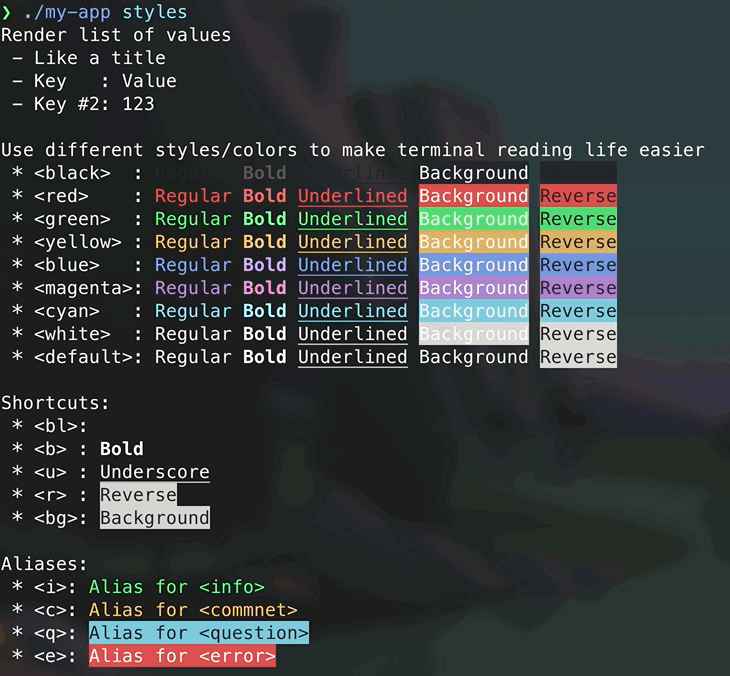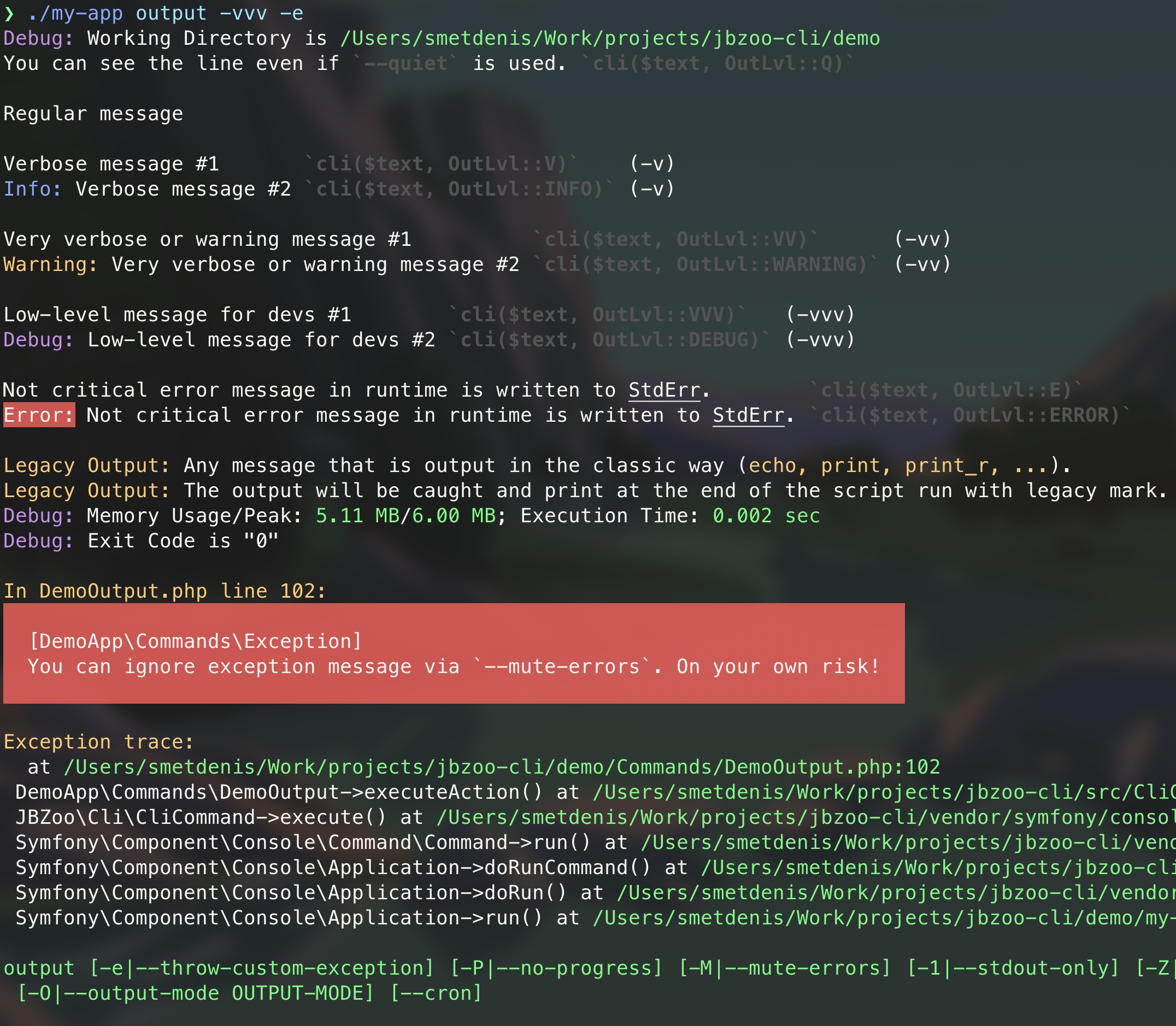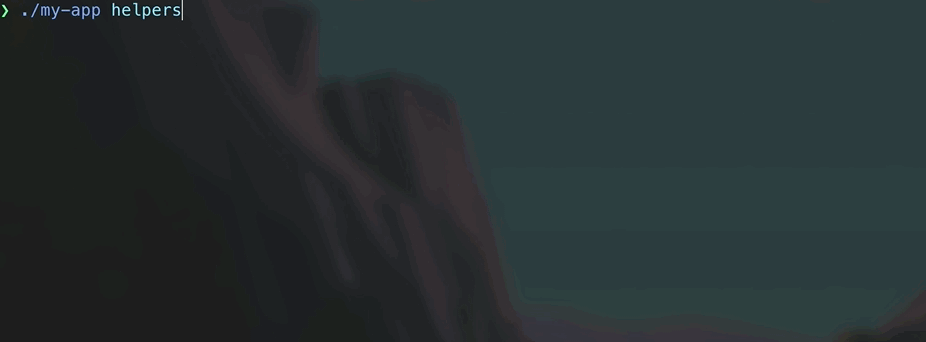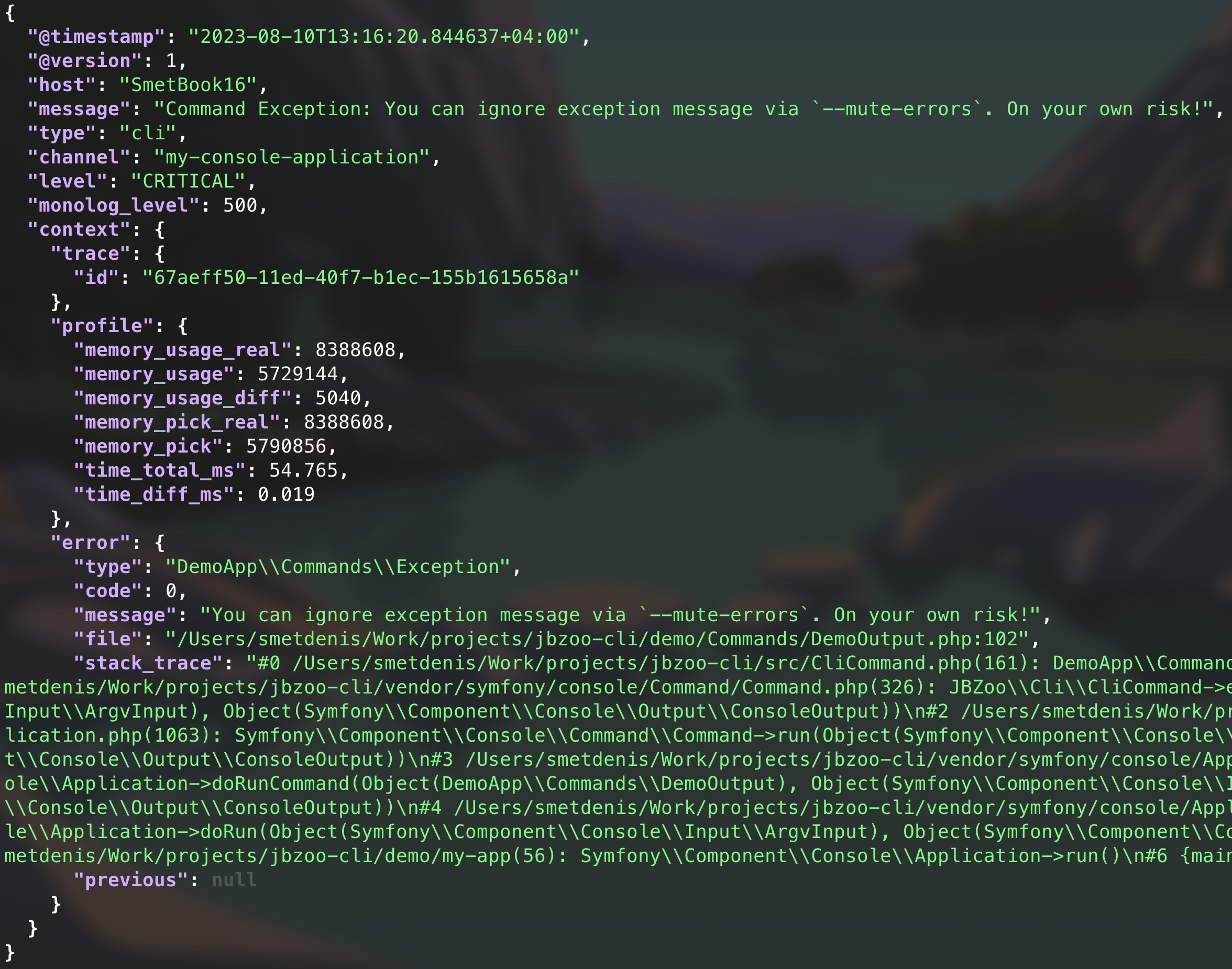jbzoo / cli
The framework helps create CLI tools and provides new tools for symfony/console, symfony/process.
Installs: 621 929
Dependents: 5
Suggesters: 0
Security: 0
Stars: 7
Watchers: 1
Forks: 0
Open Issues: 0
pkg:composer/jbzoo/cli
Requires
- php: ^8.2
- jbzoo/event: ^7.0.2
- jbzoo/utils: ^7.3
- monolog/monolog: ^3.9.0
- symfony/console: >=7.3.4
- symfony/lock: >=7.3.4
- symfony/process: >=7.3.4
Requires (Dev)
- jbzoo/toolbox-dev: ^7.3
README
- Why?
- Live Demo
- Quick Start - Build your first CLI App
- Built-in Functionality
- Progress Bar
- Helper Functions
- Easy logging
- Multi processing
- Tips & Tricks
- Contributing
- Useful projects and links
- License
- See Also
Why?
JBZoo CLI Framework is a powerful PHP library that significantly extends Symfony Console functionality, making it easier and faster to create robust command-line applications. Built for PHP 8.2+, it provides enhanced features for professional CLI development.
Key Features
Enhanced Progress Bars
- Advanced progress bars with debugging information and profiling capabilities
- Simple API:
$this->progressBar($items, $callback)replaces complex Symfony ProgressBar setup - Real-time memory and performance monitoring during execution
- See Live Demo
Strict Type Conversion
- Type-safe option parsing with methods like
getOptInt(),getOptBool(),getOptString() - Built-in validation for allowed values and data integrity
- Eliminates common runtime errors from loose type handling
Professional Output System
- Simplified output API:
$this->_($message, $level, $context)instead of verbose Symfony methods - Rich styling with HTML-like tags:
<red>Error</red>,<green-b>Success</green-b> - Context-aware JSON logging for structured data
Multiple Output Modes
--output-mode=text- User-friendly console output (default)--output-mode=cron- Optimized for crontab logging with timestamps and profiling--output-mode=logstash- JSON format for ELK Stack integration
Performance & Debugging
- Built-in profiling with
--profileflag showing memory usage and execution time - Timestamping with
--timestampfor detailed logging - Verbosity levels from quiet (
-q) to debug (-vvv)
Advanced Features
- Multiprocessing support for parallel execution (not multithreading)
- Interactive helpers for user input, confirmations, and selections
- Error handling with configurable exit codes and output streams
Live Demo
Output regular messages
Progress Bar Demo
Quick Start - Build your first CLI App
Installing
composer require jbzoo/cli
The simplest CLI application has the following file structure. See the Demo App for more details.
File Structure
/path/to/app/
my-app # Binary file (See below)
composer.json # Composer file
/Commands/ # Commands directory
Simple.php # One of the commands (See below)
/vendor/
autoload.php # Composer autoload
Composer file
See Details
{
"name" : "vendor/my-app",
"type" : "project",
"description" : "Example of CLI App based on JBZoo/CLI",
"license" : "MIT",
"keywords" : ["cli", "application", "example"],
"require" : {
"php" : "^8.2",
"jbzoo/cli" : "^7.0"
},
"autoload" : {
"psr-4" : {"DemoApp\\" : ""}
},
"bin" : ["my-app"]
}
Binary file
Binary file: demo/my-app
See Details
#!/usr/bin/env php <?php declare(strict_types=1); namespace DemoApp; use JBZoo\Cli\CliApplication; // Init composer autoloader require_once __DIR__ . '/vendor/autoload.php'; // Optional. Set your application name and version. $application = new CliApplication('My Console Application', 'v1.0.0'); // Optional. Looks at the online generator of ASCII logos // https://patorjk.com/software/taag/#p=testall&f=Epic&t=My%20Console%20App $application->setLogo( <<<'EOF' __ __ _____ _ | \/ | / ____| | | /\ | \ / |_ _ | | ___ _ __ ___ ___ | | ___ / \ _ __ _ __ | |\/| | | | | | | / _ \| '_ \/ __|/ _ \| |/ _ \ / /\ \ | '_ \| '_ \ | | | | |_| | | |___| (_) | | | \__ \ (_) | | __/ / ____ \| |_) | |_) | |_| |_|\__, | \_____\___/|_| |_|___/\___/|_|\___| /_/ \_\ .__/| .__/ __/ | | | | | |___/ |_| |_| EOF, ); // Scan directory to find commands. // * It doesn't work recursively! // * They must extend the class \JBZoo\Cli\CliCommand $application->registerCommandsByPath(__DIR__ . '/Commands', __NAMESPACE__); // Optional. Action name by default (if there is no arguments) $application->setDefaultCommand('list'); // Run application $application->run();
Simple CLI Action
The simplest CLI action: ./demo/Commands/DemoSimple.php
See Details
<?php declare(strict_types=1); namespace DemoApp\Commands; use JBZoo\Cli\CliCommand; use JBZoo\Cli\Codes; class Simple extends CliCommand { protected function configure(): void { // Action name. It will be used in command line. // Example: `./my-app simple` $this->setName('simple'); // Define inherited CLI options. See ./src/CliCommand.php for details. parent::configure(); } protected function executeAction(): int { // Your code here $this->_('Hello world!'); // Exit code. 0 - success, 1 - error. return self::SUCCESS; } }
Built-in Functionality
Sanitize input variables
As live-demo take a look at demo application - ./demo/Commands/DemoOptionsStrictTypes.php.
Try to launch ./my-app options-strict-types.
// If the option has `InputOption::VALUE_NONE` it returns true/false. // --option-name $value = $this->getOpt('option-name'); // `$value === true` // --option-name=" 123.6 " $value = $this->getOpt('option-name'); // Returns the value AS-IS. `$value === " 123.6 "` // --option-name=" 123.6 " $value = $this->getOptBool('option-name'); // Converts an input variable to boolean. `$value === true` // --option-name=" 123.6 " $value = $this->getOptInt('option-name'); // Converts an input variable to integer. `$value === 123` $value = $this->getOptInt('option-name', 42, [1, 2, 42]); // Strict comparing with allowed values // --option-name=" 123.6 " $value = $this->getOptFloat('option-name'); // Converts an input variable to float. `$value === 123.6` $value = $this->getOptFloat('option-name', 1.0, [1.0, 2.0, 3.0]); // Strict comparing with allowed values // --option-name=" 123.6 " $value = $this->getOptString('option-name'); // Converts an input variable to trimmed string. `$value === "123.6"` $value = $this->getOptString('option-name', 'default', ['default', 'mini', 'full']); // Strict comparing with allowed values // --option-name=123.6 $value = $this->getOptArray('option-name'); // Converts an input variable to trimmed string. `$value === ["123.6"]` // --option-name="15 July 2021 13:48:00" $value = $this->getOptDatetime('option-name'); // Converts an input variable to \DateTimeImmutable object. // Use standard input as input variable. // Example. `echo " Qwerty 123 " | php ./my-app agruments` $value = self::getStdIn(); // Reads StdIn as string value. `$value === " Qwerty 123 \n"`
Rendering text in different colors and styles
There are list of predefined colors
<black> Text in Black color </black> <red> Text in Red Color </red> <green> Text in Green Color </green> <yellow> Text in Yellow Color </yellow> <blue> Text in Blue Color </blue> <magenta>Text in Magenta Color</magenta> <cyan> Text in Cyan Color </cyan> <white> Text in White Color </white> <!-- Usually default color is white. It depends on terminal settings. --> <!-- You should use it only to overwrite nested tags. --> <default>Text in Default Color</default>
There are list of predefined styles
<bl>Blinked Text</bl> <b>Bold Text</b> <u>Underlined Text</u> <r>Reverse Color/Backgroud</r> <bg>Change Background Only</bg>
Also, you can combine colors and styles.
<magenta-bl>Blinked text in magenta color</magenta-bl> <magenta-b>Bold text in magenta color</magenta-b> <magenta-u>Underlined text in magenta color</magenta-u> <magenta-r>Reverse text in magenta color</magenta-r> <magenta-bg>Reverse only background of text in magenta color</magenta-bg>
And predefined shortcuts for standard styles of Symfony Console
<i> alias for <info> <c> alias for <commnet> <q> alias for <question> <e> alias for <error>
Verbosity Levels
Console commands have different verbosity levels, which determine the messages displayed in their output.
For a live demonstration, see the demo application ./demo/Commands/DemoOutput.php and watch the Demo video.
Example of usage of verbosity levels
// There are two recommended output methods: /** * Prints a message to the output in the command class which inherits from the class \JBZoo\Cli\CliCommand * * @param string|string[] $messages Output message(s). Can be an array of strings or a string. Array of strings will be imploded with new line. * @param string $verboseLevel is one of value form the class \JBZoo\Cli\OutLvl::* * @param string $context is array of extra info. Will be serialized to JSON and displayed in the end of the message. */ $this->_($messages, $verboseLevel, $context); /** * This is a global alias function of `$this->_(...)`. * Use this when you need to display text from classes that don't extend CliCommand. */ JBZoo\Cli\cli($messages, $verboseLevel, $context);
# Do not output any message ./my-app output -q ./my-app output --quiet # Normal behavior, no option required. Only the most useful messages. ./my-app output # Increase verbosity of messages ./my-app output -v # Display also the informative non essential messages ./my-app output -vv # Display all messages (useful to debug errors) ./my-app output -vvv
Memory and time profiling
As live-demo take a look at demo application - ./demo/Commands/DemoProfile.php.
Try to launch ./my-app profile --profile.
Progress Bar
As live-demo take a look at demo application - ./demo/Commands/DemoProgressBar.php and Live Demo.
You can consider this as a substitute for the long cycles you want to profile.
Keep in mind that there is an additional overhead for memory and runtime to calculate all the extra debugging information in --verbose mode.
Simple example
$this->progressBar(5, function (): void { // Some code in loop });
Advanced usage
$this->progressBar($arrayOfSomething, function ($value, $key, $step) { // Some code in loop if ($step === 3) { throw new ExceptionBreak("Something went wrong with \$value={$value}. Stop the loop!"); } return "<c>Callback Args</c> \$value=<i>{$value}</i>, \$key=<i>{$key}</i>, \$step=<i>{$step}</i>"; }, 'Custom messages based on callback arguments', $throwBatchException);
Helper Functions
As live-demo take a look at demo application - ./demo/Commands/DemoHelpers.php.
Try to launch ./my-app helpers.
JBZoo/Cli uses Symfony Question Helper as base for aliases.
Regular question
Ask any custom question and wait for a user's input. There is an option to set a default value.
$yourName = $this->ask("What's your name?", 'Default Noname'); $this->_("Your name is \"{$yourName}\"");
Ask user's password
Ask a question and hide the response. This is particularly convenient for passwords. There is an option to set a random value as default value.
$yourSecret = $this->askPassword("New password?", true); $this->_("Your secret is \"{$yourSecret}\"");
Ask user to select the option
If you have a predefined set of answers the user can choose from, you could use a method askOption which makes sure
that the user can only enter a valid string from a predefined list.
There is an option to set a default option (index or string).
$selectedColor = $this->askOption("What's your favorite color?", ['Red', 'Blue', 'Yellow'], 'Blue'); $this->_("Selected color is {$selectedColor}");
Represent a yes/no question
Suppose you want to confirm an action before actually executing it. Add the following to your command.
$isConfirmed = $this->confirmation('Are you ready to execute the script?'); $this->_("Is confirmed: " . ($isConfirmed ? 'Yes' : 'No'));
Rendering key=>value list
If you need to show an aligned list, use the following code.
use JBZoo\Cli\CliRender; $this->_(CliRender::list([ "It's like a title", 'Option Name' => 'Option Value', 'Key' => 'Value', 'Another Key #2' => 'Qwerty', ], '*')); // It's bullet character
* It's like a title
* Option Name : Option Value
* Key : Value
* Another Key #2: Qwerty
Easy logging
Simple log
./my-app output --timestamp >> /path/to/crontab/logs/$(date +%Y-%m-%d).log 2>&1
Crontab
Just add the --output-mode=cron flag and save the output to a file. Especially, this is very handy for saving logs for Crontab.
./my-app output --output-mode=cron >> /path/to/crontab/logs/$(date +%Y-%m-%d).log 2>&1
Elasticsearch / Logstash (ELK)
Just add the --output-mode=logstash flag and save the output to a file. Especially, this is very handy for saving logs for ELK Stack.
./my-app output --output-mode=logstash >> /path/to/logstash/logs/$(date +%Y-%m-%d).log 2>&1
Multi processing
There is a multiprocess mode (please don't confuse it with multithreading) to speed up work with a monotonous dataset. Basically, JBZoo\Cli will start a separate child process (not a thread!) for each dataset and wait for all of them to execute (like a Promise). This is how you get acceleration, which will depend on the power of your server and the data processing algorithm.
You will see a simple progress bar, but you won't be able to profile and log nicely, as it works for normal mode.
You can find examples here
- ./tests/TestApp/Commands/TestSleepMulti.php - Parent command
- ./tests/TestApp/Commands/TestSleep.php - Child command
Notes:
- Pay attention on the method
executeOneProcess()andgetListOfChildIds()which are used to manage child processes. They are inherited fromCliCommandMultiProcclass. - Optimal number of child processes is
Number of CPU cores - 1. You can override this value by setting cli options. See them here ./src/CliCommandMultiProc.php. - Be really careful with concurrency. It's not easy to debug. Try to use
-vvvoption to see all errors and warnings.
Tips & Tricks
- Use class
\JBZoo\Cli\Codesto get all available exit codes. - You can add extra context to any message. It will be serialized to JSON and displayed at the end of the message. Just use
CliHelper::getInstance()->appendExtraContext(['section' => ['var' => 'value']]); - You can define constant
\JBZOO_CLI_TIMESTAMP_REAL=trueto addtimestamp_realas extra context. Sometimes it's useful for logstash if the default value@timestampdoesn't work for you.
Contributing
# Fork the repo and build project make update # Make your local changes # Run all tests and check code style make test-all # Create your pull request and check all tests on GitHub Actions page
Useful projects and links
- Symfony/Console Docs
- kevinlebrun/colors.php - New colors for the terminal
- php-school/cli-menu - Interactive menu with nested items
- nunomaduro/collision - Beautiful error reporting
- splitbrain/php-cli - Lightweight and no dependencies CLI framework
- thephpleague/climate - Allows you to easily output colored text, special formats
- Exit Codes With Special Meanings
- How to redirect standard (stderr) error in bash
License
MIT
See Also
- CI-Report-Converter - Converting different error reports for deep compatibility with popular CI systems.
- Composer-Diff - See what packages have changed after
composer update. - Composer-Graph - Dependency graph visualization of composer.json based on mermaid-js.
- Mermaid-PHP - Generate diagrams and flowcharts with the help of the mermaid script language.
- Utils - Collection of useful PHP functions, mini-classes, and snippets for every day.
- Image - Package provides object-oriented way to manipulate with images as simple as possible.
- Data - Extended implementation of ArrayObject. Use files as config/array.
- Retry - Tiny PHP library providing retry/backoff functionality with multiple backoff strategies and jitter support.
- SimpleTypes - Converting any values and measures - money, weight, exchange rates, length, ...









